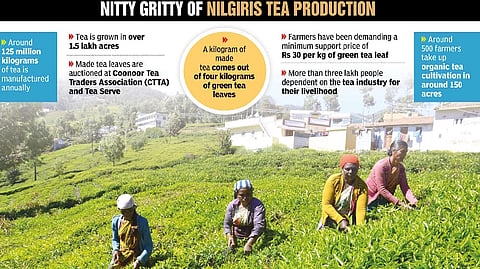

COIMBATORE: Tea growers in The Nilgiris are deeply anguished as green tea leaf prices have hit an all-time low. Prices of tea leaves, which were on a downward spiral, have nose-dived to around Rs 10 per kg in the last few months.
“Tea leaf prices have never hit this low in the last three to four years. This drastic price drop was triggered by bountiful yield following heavy rains and favourable climatic conditions. A marginal drop in prices is agreeable, but the existing drop seems artificial and created by corporate bulk buyers,” said B Venugopal, founder of Nilgiris Small Scale Tea Growers Awareness Centre.
Farmers rued that such downward trend is witnessed since March this year and prices plunged to less than the TEA Board fixed price of around Rs 12 per kg for the month of August.
Before, the going price of green tea leaf was around Rs 15 and above. “Factories weren’t paying the TEA Board fixed prices to growers citing surplus supply. Made tea arriving in auction centres has also peaked from five to ten lakh kilograms to nearly 20 lakh kilograms per week,” said S Vinod, a tea farmer.
Surprisingly, the green tea leaf prices peaked to Rs 30 per kg during COVID-19 lockdown period, when the demand for tea grew high presumably due to its antioxidant properties.
A study by the Horticulture Department has put the cost of producing tea leaves at Rs 22.50 per kg by taking into consideration labour, transportation, fertilizer and other input costs.
‘Thumbur’ I Bojan, president of Hill District Small and Marginal Farmers Association said that they have been demanding a minimum support price (MSP) of Rs 30 per kg of green tea leaf.
“The farmers also made a series of representations to the state government and protested in this regard, but to no avail. Small and marginal farmers are facing heavy loss due to low price realisation for tea leaves, he said.
Tea factories too claim to be realising poorer returns for made tea in auctioning markets. “The made tea, which was auctioned for around Rs 100 per kilogram in January, this year, dropped to Rs 80 in the March and further down to Rs 70 in the last few months. Such a negative trend recurs once in every five years or so,” said Venugopal.
However, after a lull, the prices of made tea have begun to look up marginally again now. Tea farming proves to be the backbone of the hill’s fragile economy as it provides direct employment to more than three lakh people by means of plucking tea leaves, transportation and processing firms. Tea is grown in over 1.5 lakh acres, of which one lakh acres is managed by small tea growers in the hill district.
Slow and steady steps taken to promote organic tea, vegetable cultivation in the hills
On a mission to promote organic cultivation of green tea leaves, The Nilgiris district administration has turned its focus on creating awareness among the cultivators to reduce use of chemical fertilizers and adopt sustainable practices.
At present, the area of organic green tea leaf cultivation remains negligible. But, this trend may soon change for the better due to the action plan mooted by the authorities.
“Farmers in Kinnakorai in Kundha Taluk have taken to organic cultivation of green tea leaves with the funding of Indcoserve, which has been working for the development of small and marginal tea farmers. Around 500 farmers may switch over to organic tea farming to be taken up in around 150 acres,” said Shibila Mary, Joint Director of Horticulture (in-charge).
Farmers cultivating vegetables were also given incentives for adopting organic farming. “It will take a few more years to completely switch over to organic cultivation in both vegetable farming and tea cultivation. But, the farmers should also be forthcoming. Even in Kinnakorai, farmers were persuaded with great struggle to make the switch over,” she said.
The Horticulture Department has been working with a target to reach organic cultivation of both vegetable and tea in around 500 hectares in the hill district.
“In a step forward, 20 clusters have been formed among farmers and they were entrusted with the task of carrying forward our organic mission. Farmers would generally agree and adopt, if someone from their community proposes the organic farming concept rather than authorities. On our part, the farmers will be gradually trained and guided into taking up organic tea production,” added Shibila Mary.
Wary of a Sri Lanka like crisis, where a blanket ban on use of fertilizers led to sudden production drop and eventually spiraled into an economic crisis, the authorities here have set their goals clear to ensure that any drastic measures shouldn’t hit the livelihood of farmers.
“Small tea growers have already stopped using chemical spray to boost growth of tea leaves. However, large estates use those chemicals in excess to increase the quantum of production. There is even a plan to provide incentive to farmers, in whose farmlands the organic carbon is found to be high. Once the uniqueness of the product is created, it may help the farmers here to tap better market opportunities,” said B Venugopal, founder of Nilgiris Small Scale Tea Growers Awareness Centre, who is also part of the organic tea mission.
Visit news.dtnext.in to explore our interactive epaper!
Download the DT Next app for more exciting features!
Click here for iOS
Click here for Android